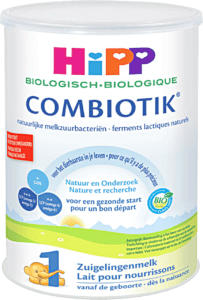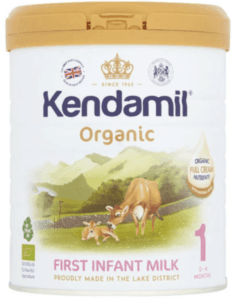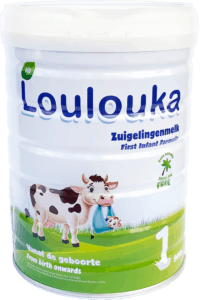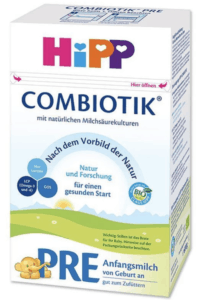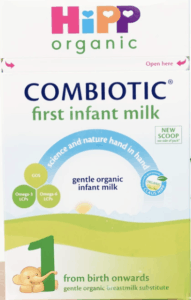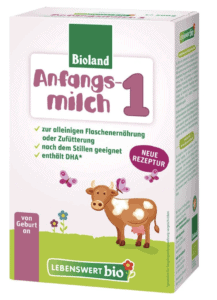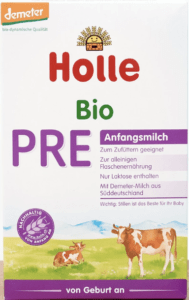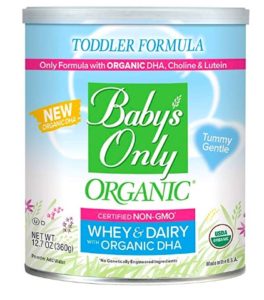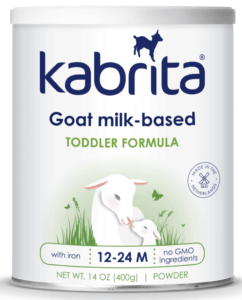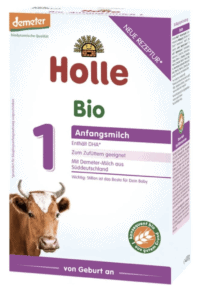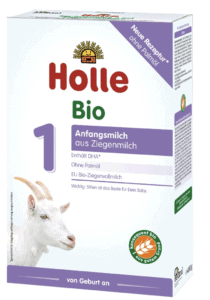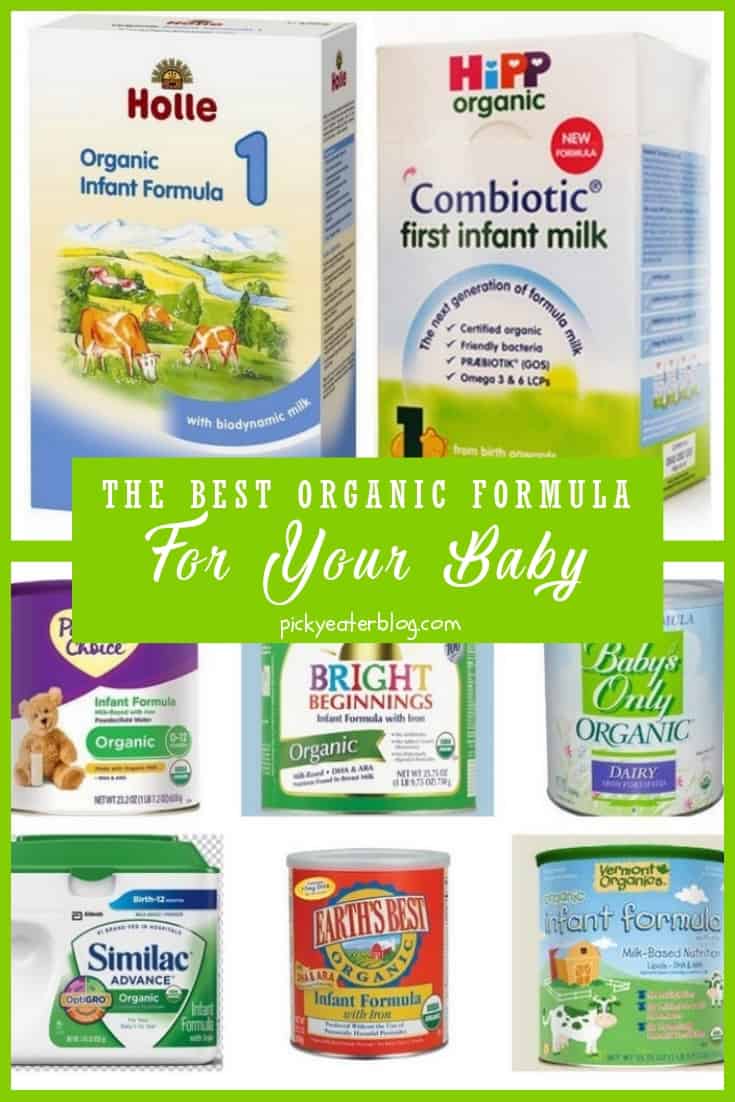This post may contain affiliate links. As an Amazon Associate, I earn from qualifying purchases. Please read my disclosure.
This in-depth, parent-friendly guide will help you find and buy the best organic baby formula. You will learn why you should consider organic formula, what ingredients to avoid in formula, and where you can reliably purchase the best organic baby formulas. This guide is updated monthly to ensure that all of the information below is recent and accurate!
Click here to see the 10 best organic baby formulas!
What Is Organic Baby Formula?
Organic baby formula is formula made with at least 95% organic ingredients. This means all of the ingredients in the formula have to adhere to organic standards which include:
- No GMOs (Genetically Modified Organisms)
- No growth hormones or steroids
- No antibiotics (or used extremely rarely – only when an animal is extremely sick and no other options will resolve the issue)
- No artificial colors or flavors
- All animals are fed an organic diet
- No synthetic / artificial preservatives
- No pesticides or insecticides
In Europe, these standards are more heavily regulated than in the US, and additional considerations are added like:
- No sugar or syrup solids
- Requires at least 30% of calories from lactose (the naturally occurring carbohydrate in milk)
- No synthetic nutrients extracted with chemical solvents
Note: Certified organic is different than “made with organic ingredients.” If a package has the label “made with organic ingredients” it means that 70% of the ingredients are organic, not 95%.
Is Organic Baby Formula Better For Your Baby?
The benefits to buying organic baby formula are similar to buying organic foods in general. By buying organic baby formula, you can guarantee that your baby’s formula is made without growth hormones, genetically modified ingredients, pesticides, herbicides, fungicides, antibiotics, etc.
Most organic baby formulas also have the added plus of not using ingredients like syrup solids, carrageenan, etc. that aren’t beneficial for your baby.
Many doctors will say that there isn’t enough research on the topic of whether infant organic formula provides your baby with a clear, long term health advantage (vs. conventional formula). Organic milk formula also tends to be more expensive.
That said, if you can afford organic all natural formula, those added benefits might be worth it to you, provided that the cost of organic formula brands fits your budget.
Luckily, there are some budget friendly organic formula options available (see our quick picks below). And if you can’t afford an organic formula, I recommend choosing a non organic formula that meets our criteria for choosing the best formula overall (so while you may not be able to find an organic formula that fits your budget, you may still be able to find a non-organic clean formula for babies that does not include syrup solids, carrageenan, etc. that you can afford).
Quick Picks: Best Organic Baby Formula
Here is our “at a glance” view of the best baby formula for different needs. Looking for an affordable clean baby formula? A hypoallergenic formula? The best overall? We have you covered.
We chose these formulas based on: over 100 hours of research, speaking with thousands of parents on what has worked for their children (along with personal experience with my own two kids), reviewing the ingredients of over 65 different formula brands, stages and varieties, speaking with doctors and pediatricians, and reviewing countless articles and peer reviewed studies.
Further down in this guide you will find a detailed list of the top 10 best organic baby formulas, a few runner ups (good formula brands that didn’t make our top list), and why we love each of those options.
Some of the items below were given to me to review by the manufacturer or as part of an affiliate program. I may receive commissions if you make a purchase through the links provided. I only recommend products I’ve actually evaluated, I believe are the highest quality, and can do the most to help you and your family. By purchasing any of these products from the links below, you help keep this blog running, so thanks for your support!
Keep in mind that every person & situation is different, especially yours, so make sure to talk to your doctor and see how these guidelines and tips can help you. These tips are not a substitute for professional medical advice, diagnosis, or treatment. Never disregard or delay in seeking professional medical advice because of something you read here!
What Are The Different Types Of Baby Formula?
- Organic Cow’s Milk Based Formula: Most of this type of clean infant formula found at the grocery store is made from cow’s milk, and organic milk formula assures that at least 95 percent of all the ingredients and processing aids are organic and that the product is free from preservatives, toxins, artificial colors, and artificial flavors.
- Non-Organic Cow’s Milk: Non-organic cow’s milk formula is still made from cow’s milk (hence the name), yet it might contain hormones, chemicals, and pesticides since it is not organic.
- Organic Goat’s Milk Baby Formula: Goat milk is very similar to dairy-based formulas in terms of nutrients. But, because it’s made from goat milk which contains the A2 milk protein (vs. A1 for cow’s milk), it may be easier for some babies to digest who are intolerant to cow’s milk. Organic goat’s milk is non-GMO and free from preservatives, toxins, etc.
- Non-Organic Goat’s Milk: Non-organic goat’s milk is more common than its organic counterpart. However, it is a popular option because non organic goat milk still has the A2 vs. A1 milk protein.
- Partially Hydrolyzed (Hypoallergenic Formula): Hydrolyzed formulas have partially (or completely) broken down milk proteins, which may help babies with a milk protein allergy or who just have more sensitive tummies.
- A2 Milk: A2 milk is an alternative to regular cow’s milk that is often easier for babies to digest. A2 milk can come from goats, or from a small population of cow’s that happen to produce A2 vs. A1 milk.
- Soy Based: These formulas don’t contain any milk and use soy protein as the base. They are a non dairy formula option. Note: You should always consult your pediatrician before considering a soy formula for your child, due to research that shows it may not be suitable for all babies.
- Toddler Formula: While most toddlers don’t need formula, toddler formula is designed to be consumed after a child’s first year of life. Essentially, it is a kind of transition formula, and can be used to supplement a picky eater’s diet with critical nutrients.
- Plant Based Baby Formula: Plant-based formula is made without using animal products. Basically, you can think of it as being a dairy free baby formula or vegan formula option. Formulas like Else and Baby’s Only Pea Protein are common vegan formulas available in the US. If you are looking for the best dairy free formula for babies, go to this guide.
- Powder Vs. Liquid: Most all natural infant formula comes in a powdered option, where you have to mix the water before serving. Some powdered formulas will also have a liquid option, which means the formula is already pre-mixed and pre-made so you can feed it to your baby immediately. Liquid formulas are also known as “ready to feed” formulas. There are some organic ready made formula options, but they may have more stabilizers than powdered versions to keep them shelf stable.
European Vs. American Baby Formula
When I was choosing a natural infant formula for my kids, I chose a European Organic Baby Formula instead of purchasing one from the US. What’s the difference between European and US baby formula?
All US based formulas are regulated by the FDA and organic milk based formula brands earn a certification from the USDA on top of being regulated by the FDA. The FDA is responsible for ensuring formulas meet infant nutrition requirements, while the USDA Organic certification means that the baby organic formula is adhering to the organic guidelines mentioned above (e.g. no pesticides, antibiotics, etc.).
All European Formulas are regulated by the European Commission, which also certifies formulas as organic. Additionally, Europe has designations that are “beyond organic” like “Demeter” or “Bioland”.
Demeter essentially means biodynamic farming on top of organic farming. It is focused on creating the most humane conditions for the cows and ensuring the farm “gives back” to the environment in their practices. “Bioland” means that the entire farm is 100% organic and there are no nonorganic products produced on that farm. Bioland is more strict than organic, but not as strict as Demeter. Holle is the only European formula that is Demeter certified, and Lebenswert is Bioland certified.
It’s worth nothing that the EU and USDA are aligned on a few things when it comes to what gets the official “Organic” label:
- Both US and European formulas can only be considered organic if 95% or more of the ingredients are organic.
- Both US and European organic formulas will not come from cows that have been given artificial growth hormones.
- Both US and European formulas will contain the essential nutrients to support baby’s growth and development.
So Why Choose European Formulas? Overall, Europe has higher standards and has more options for high quality organic formula available to parents. There are some American Brands that are similar to European brands in quality and ingredients, and we have included those options in this guide as well.
When it comes to regulation, anecdotally I have heard and seen that Europe regulates organic standards much more strictly than the US does. Not only do European organic baby formulas have to meet the 95%+ organic ingredients, the EU requires more transparency and has stricter regulations when it comes to detecting trace amounts of any toxic substances in natural baby formula.
Historically, most formulas, especially those produced in the United States, have been loaded with ingredients that aren’t very healthy for your baby.
The good news is, there are more and more high-quality, organic baby formulas available to parents today.
How To Choose The Best Baby Formula
While all of this information might seem overwhelming, at the very least, I recommend following these guidelines when choosing the best formula for your baby:
- Organic if possible, and if you can’t afford organic, try to find a non-GMO or at least a formula with no syrup solids.
- Helpful nutrients – added DHA, ARA for brain development, prebiotics & probiotics for immune and gut health.
- Strong reviews from other parents (we used organic formula reviews as criteria for ranking the options below as well!)
- Pediatrician approval – your pediatrician knows your baby and has experience with many of these formulas, so they should be able to help you figure out which of these formulas will suit your baby the best!
This list includes both European and US formulas. If you are looking for help finding the best baby formula brands made in the US only, go to this post.
Below, I have summarized my research to help answer the question: what is the best organic baby formula available today? Later in the post, I cover what to look for in choosing an organic baby formula, the main ingredients to avoid in baby formula, provide an analysis of each top formula, include a detailed chart that ranks all of the organic formulas available, and list a few reliable places to buy formulas online.
The 10 Best Organic Baby Formulas (Summary)
While there is no perfect natural formula, the baby formulas below are considerably better than the rest. Read on to see the best natural formula for babies and our top picks based on your baby’s individual needs.
Ideal Organic Baby Formula Ingredients
Here’s our ideal list of baby formula ingredients and criteria, and how we made our picks for the best formula for babies in this guide.
✅ Certified Organic (either USDA certified organic, or EU certified organic).
✅ Meets nutritional standards for babies (in the US or the EU) and includes key vitamins and minerals for development
✅ No sugar, sucrose, or syrup solids (you want a formula without sugar, where lactose is the main carbohydrate)
✅ Whey to casein ratio that matches mature breastmilk (60:40 whey to casein ratio)
✅ Includes Omega 3 Fats (DHA, ALA) and Omega 6 fatty acids (ARA, LA)
✅ Includes prebiotics and probiotics
✅ Gluten free, soy free (with the exception of organic soybean oil, and organic soy lecithin, which is ok)
✅ Palm oil free (or uses palmitic acid, or sustainable palm oil)
✅ No carrageenan
✅ No hexane extracted ingredients if possible (DHA specifically), or no hexane detected post extraction
✅ No maltodextrin
✅ Mixes easily, reviews state that most babies can tolerate it well
✅ Suits your budget
Ingredients To Avoid in Organic Baby Formula
The US has a much larger range of standards for organic baby formula, which means that even the best organic formulas can have lower quality ingredients. Below are the ingredients that shouldn’t appear in organic formula – as outlined by the National Organic Standards Board – and are banned in the European Union, which really is the gold standard for what’s considered organic. Organic formula should not have:
❌ Processed Refined Sugars (Syrup, Syrup Solids): Corn syrup solids (glucose syrup solids), maltodextrin (a partially hydrolyzed starch derived from corn, rice, or potatoes), sugar, or brown rice syrup. Manufacturers use these because they are cheaper than lactose (which is what should be in formula).
❌ Oils extracted using hexane (DHA, ARA): DHA and ARA are important to have in baby formula, because they are essential fatty acids that are important for both brain development and eye development. However, specific types of DHA and ARA – C. Cohnii oil (DHA) and M. Alpina oil (ARA) are processed using hexane (a neurotoxic petroleum-based solvent). There are other forms of DHA and ARA that can be added to formula that do not require hexane for extraction. While the hexane is removed from the formula after processing and is non-detectable in European Formulas (see my detailed section on hexane at the end of this post), it’s worth noting that DHA and ARA do not need hexane for extraction when derived from sources other than algae and fungus. It’s also worth noting that any oils that are listed as “organic” on EU formula labels cannot use hexane for extraction.
❌ Carrageenan: typically added as a stabilizer to ready-to-feed formula in the US; it is not allowed in the EU and has been linked to intestinal inflammation.
❌ Synthetic Nutrients Extracted Using Chemical Solvents: This includes lutein, lycopene, nucleotides, taurine, l-carnitine and l-methionine. Some of these nutrients are not allowed in EU formulas, some of them (like lutein) are beneficial to babies, but they ideally are extracted not using hexane.
❌ Palm Oil: to mirror the levels of palmitic acid, which is found in breastmilk, some manufacturers add palm oil. The problem is that palm oil in formula does not act the same way that palmitic acid does in the baby’s gut. Palm oil reacts with calcium, and causes the formation of “soaps” in the baby’s intestines (which can cause digestive issues). Palm oil is in most formulas (EU & US), but more manufacturers are now making formula without it.
❌ Soy: Soy protein (and soy formula) are problematic for infants because of their phytoestrogen content (check out this study about soy).
Unfortunately, nearly all baby formulas sold in the US have one or more of these ingredients to avoid.
So what’s a parent to do?
Stick to the high-quality European formulas, or US formulas like Bobbie which mimic European standards.. The EU has some of the best organic baby formula options, and HiPP, Holle, and Lebenswert, all produce the high quality formulas with the best ingredients.
Below, you can find more details on the 10 best baby formulas available on the market today, and a list of places where you can buy these formulas online.
The 10 Best Organic Baby Formulas (Details)
1. HiPP Dutch – Best Overall

Why I love it: Of all the formulas, this is the best organic baby formula. It has a whey-to-casein ratio that mimics breast milk, uses vegetable oils for fat, contains prebiotics and probiotics, and contains DHA/ARA. It’s also free of GMO ingredients, added sugars, starch, soy, and synthetic nutrients and preservatives. It also comes in an easy-to-dispense, airtight container! Because of its closeness to breastmilk, it can be one of the best formulas to supplement breastfeeding. HiPP has lots of different formulas, but HiPP Dutch is the best HiPP formula you can find.
Keep in mind: If you are concerned about hexane extraction, HiPP organic baby formula uses this method to retrieve the DHA and ARA in their formula. They claim, however, that 100% of the hexane is removed after extraction and is not detectable in their formulas. Given that this European brand follows guidelines that are much more stringent than those in the US, I’m inclined to believe them.
2. Kendamil – Best Whole Milk Formula with Prebiotics, DHA and ARA
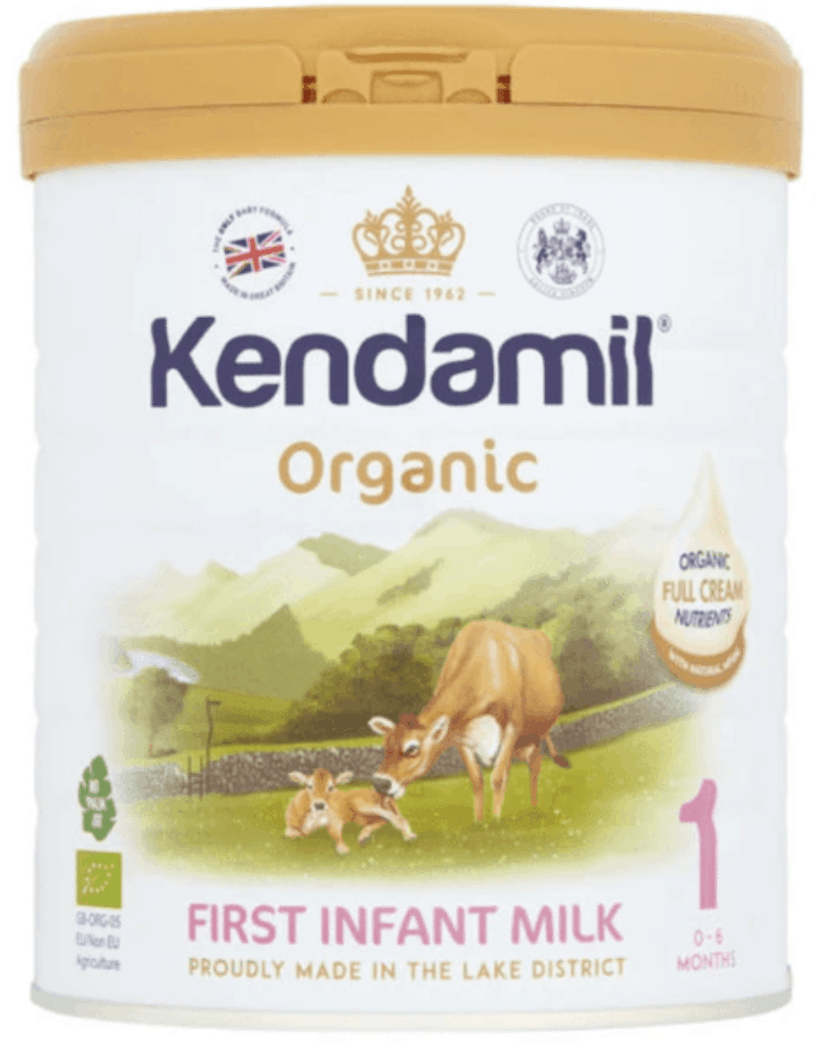
Why I love it: Kendamil is the only formula that uses whole milk instead of skimmed milk, and also does not contain soy oil or palm oil. Kendamil’s cows graze on pasture and are grass fed, they use coconut oil as one of their main fatty acids, and their formula contains non-hexane extracted DHA, ARA and Prebiotics. It is also one of the best formula milk for infants, due to its addition of HMOs and whole milk formulation. When it comes to Kendamil vs. Loulouka formula, we have ranked Kendamil first because it’s more comprehensive and is easier to find than Loulouka.
Keep in mind: This formula does not contain probiotics, so you may have to supplement if you choose this for your baby. It also contains taurine, l-carnitine, and nucleotides, but Kendamil does not use solvents to extract these nutrients for their formula.
3. Loulouka – Best Formula with DHA and No Palm or Soy Oil
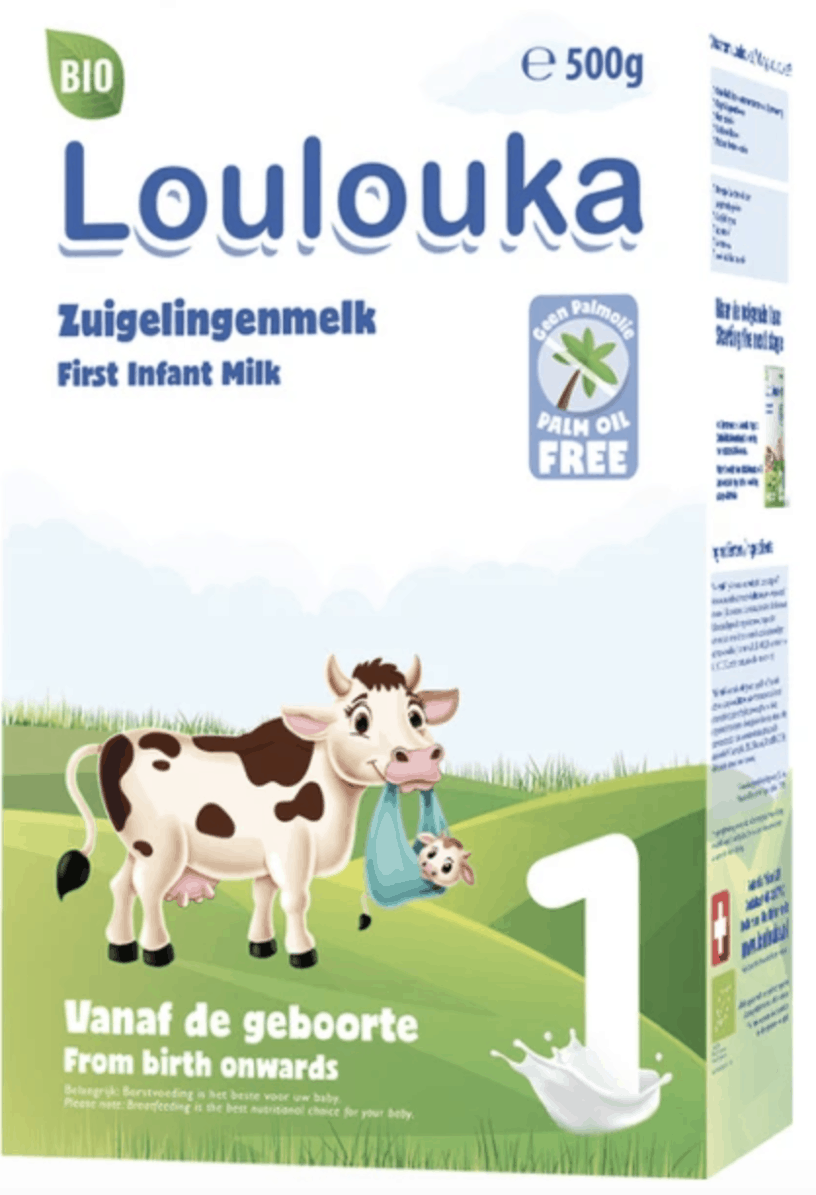
Why I love it: Loulouka is one of the few formulas that has DHA and prebiotics, but doesn’t contain soy oil or palm oil (it uses coconut oil instead!) Full of healthy fats, organic, from grass fed cows – it’s one of the best organic milk options for your little one, especially if you are looking for a formula free of ARA and probiotics.
Keep in mind: Like Lebenswert (which appears just a few spots down), this grass fed baby formula has no ARA or probiotics, so you will have to supplement if you choose this for your baby.
4. Löwenzahn Organics – Best Vegetarian Friendly Formula with Prebiotics, DHA and ARA
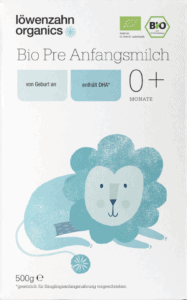
Why I love it: Löwenzahn is the only formula that makes their entire supply chain transparent to the consumer – so you can see where all of the ingredients are sourced from by scanning a bar code on the package! They also use grass-fed, organic milk, their DHA and ARA comes from algae and does not have any detectable hexane – making it a vegetarian friendly formula! It is one of the best formulas for infants thanks to its gentle formulation, and it will grow with your baby – it comes in 3 stages from birth to 12 months.
Keep in mind: This formula does not contain probiotics, so you may have to supplement if you choose this for your baby.
5. HiPP Germany – Best for Babies 0-3 Months
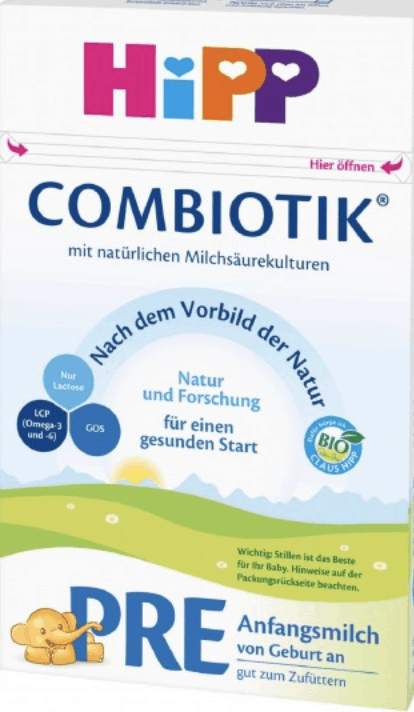
Why I love it: HiPP Germany is one of the best organic brands from Europe, and is a nutritionally complete formula that contains ingredients very similar to HiPP Dutch.
Keep in mind: HiPP PRE is meant for babies 0-3 months. Also, its container is harder to dispense from than HiPP Dutch’s is (foil bags vs. an airtight can).
6. HiPP UK – Best Value
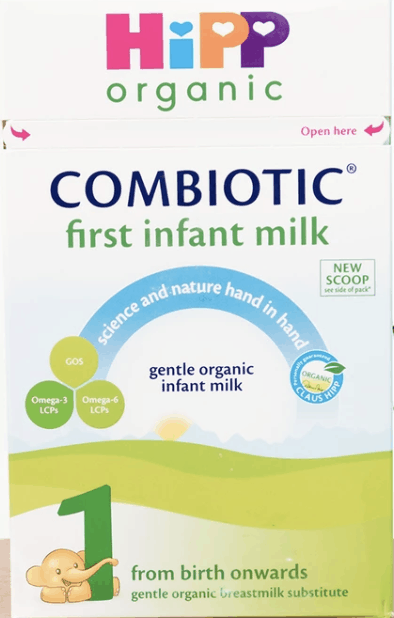
Why I love it: HiPP UK is also quite similar to HiPP Dutch. At $0.048/gram, it is the best value, healthiest organic infant formula option.
Keep in mind: The main difference between HiPP UK and HiPP Dutch (besides the price) is that it contains no probiotics, only prebiotics. Like HiPP Germany, it also has a container that’s harder to dispense from (foil bags vs. an airtight can).
7. Bobbie Organic Infant Formula – Best Organic Baby Formula Made in the US
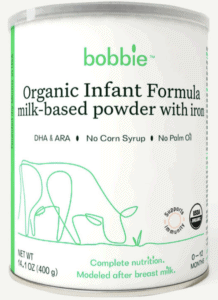
Why I love it: Bobbie is the best organic infant formula made in the US. It is the best option if you’re looking for a US-made formula that is comparable to European formulas. It’s made by parents for parents, who are looking for a nutritious, organic, clean baby formula for their little ones. This best American formula includes DHA and ARA – and does not use hexane to extract the DHA. They do use hexane to extract the ARA, but it is not detectable in their formula. Bobbie has a 60:40 whey-casein ratio, is comparable to breastmilk, is non-GMO, free of added sugars, and has no synthetic nutrients or preservatives.
Keep in mind: Bobbie does not add prebiotics or probiotics to their formula. Personally, I prefer pre/probiotics added to formula mainly for convenience. If you want to supplement with prebiotics, I recommend BeginHealth prebiotics. For the best probiotics for infants, see my recommendations here!
8. Lebenswert – Best Formula Without Prebiotics, Probiotics, and ARA
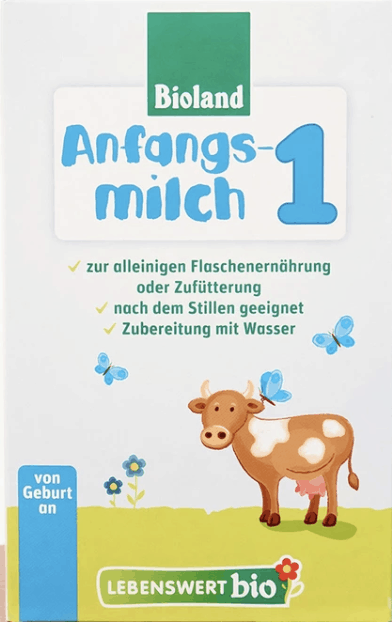
Why I love it: Lebenswert provides a great option for parents who want a simple list of clean, organic ingredients and who want to supplement with pre/probiotics and ARA separately. If hexane-extracted DHA and ARA concern you, Lebenswert may be just the thing you’re looking for. Lebenswert has DHA added from a non-hexane extracted source (organic fish oil). Lebenswert also has a proper whey-to-casein ratio and is free of added sugars, GMO ingredients, starch, soy, and synthetic nutrients and preservatives.
In addition to a top-notch ingredients list, this organic grass fed formula also boasts a Bioland certification, which is even more thorough than EU organic certification.
Keep in mind: Personally, I prefer pre/probiotics and DHA/ARA added to formula – mainly for convenience. If you want to supplement with prebiotics, I recommend BeginHealth prebiotics. For the best probiotics for infants, see my recommendations here!
9. Holle PRE – Comparable to Lebenswert, Formulated for Babies 0-3 Months
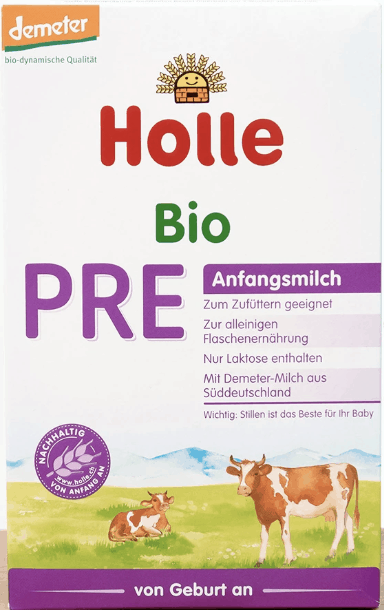
Why I love it: Holle PRE is very comparable to Lebenswert in ingredients, and is also a great option for parents who don’t want pre/probiotics or ARA added to their formula and want to supplement with that separately.
Holle baby formulas are Demeter biodynamic certified, which has even more stringent and careful regulations than Bioland. This ensures the purest, non-GMO ingredients, the highest standards for animal welfare, and a commitment to biodiversity and sustainability.
Keep in mind: Again, with Holle options, parents would need to supplement probiotics and ARA since it is not included in the formula (DHA is added in the new formulation). Holle PRE can be used until 6 months of age, but it’s specially formulated for babies 0-3 months. After 6 months you’ll have to move to a Stage 1 or 2 formula. As another note, Holle Bio PRE contains no added maltodextrin, but stages 1 and 2, which are still lactose-based, do contain added organic maltodextrin.
10. Jovie Organic Goat – Best Goat Milk Formula for Babies and Toddlers
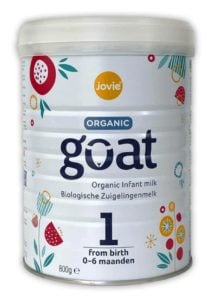
Why I love it: If you’re looking for the best organic goat milk formula, and a great alternative to cow’s milk, I’d recommend Jovie Goat. The ingredients are 100% organic, non-GMO, with added prebiotics and a whey-to-casein ratio that closely resembles that in breast milk. This best infant formula option contains no glucose syrup solids, no maltodextrin, no palm oil and no soy oil. For more details on why that’s my ideal choice for a goat milk formula, see my post on the best goat milk formulas here!
Keep in mind: Jovie doesn’t contain probiotics, so you would have to supplement. It’s also not vegetarian, as it contains fish oil.
Runner Up #1: Baby’s Only with Whey – Best Toddler Formula
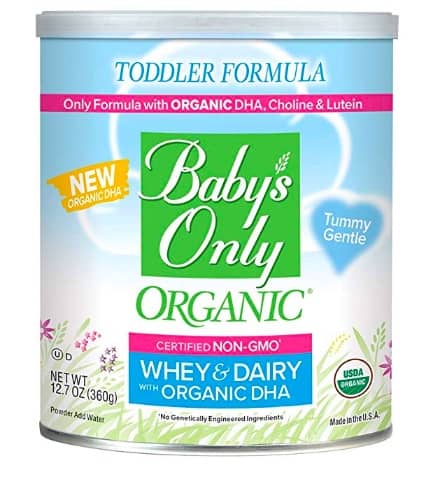
Why I love it: Baby’s Only with Whey is the one of the best cow’s milk-based formulas available in the US. It is made with organic skimmed cow’s milk, and organic whey. It has no added sugars, and is free of synthetic ingredients, and has naturally extracted DHA (from eggs).
Keep in mind: This is technically a toddler formula but similar to Kabrita, it meets the nutritional requirements for an infant formula. It also has no pre/probiotics so you would have to supplement with that separately. As with all formula, be sure to consult your pediatrician before using this for your baby.
Runner Up #2: Loulouka Goat – Best Affordable Organic Goat Infant Formula
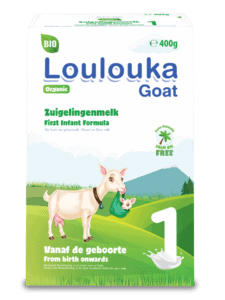
Why I love it: Loulouka goat formula is made from organic goat milk from the Swiss Alps. It’s a safe and healthy breastfeeding supplement, and a good alternative to human breastmilk that is ideal for babies from birth onwards. Loulouka also works with farms known for strict quality regulations that focus on animal welfare, sustainability and harmony with nature. It’s also more affordable than many other goat milk formula options out there!
Keep in mind: Loulouka doesn’t contain ARA, prebiotics or probiotics, so you would have to supplement. It’s also a relatively newer formula, so doesn’t have as many time tested reviews (although initial reviews look great!)
Runner Up #3: Kabrita USA – Best Goat Formula Available in the US
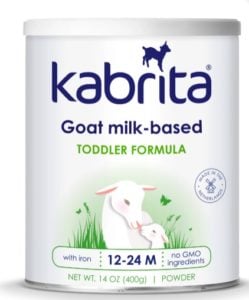
Why I love it: There are a lot of benefits to Kabrita USA. It is FDA registered, has a super clean ingredients list, is certified glyphosate free, it contains no added sugars, no maltodextrin, no syrup solids and has the right composition of fatty acids to be gentle for babies’ tummies to digest.
Keep in mind: Kabrita is technically not organic, but it does follow European standards and is non-GMO. It’s also technically a toddler formula, but it does meet the nutritional requirements of infant formula (so just make sure your pediatrician is comfortable with you using it).
Runner Up #4: Happy Baby Organic Formula – Best Infant Formula Available in the US
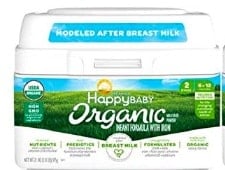
Why I love it: This is one of the best infant formulas made in the US, and doesn’t have gluten or corn syrup. It’s Non-GMO, and is designed for easy digestion. It contains DHA, pre and probiotics. And it’s also the best organic infant formula available in the US (since Baby’s Only is technically a toddler formula).
Keep in mind: This American made baby formula does contain soy oil, which is less ideal. It also has a thinner consistency that not all babies might like.
Runner Up #5: Holle Bio – Best Organic Standards
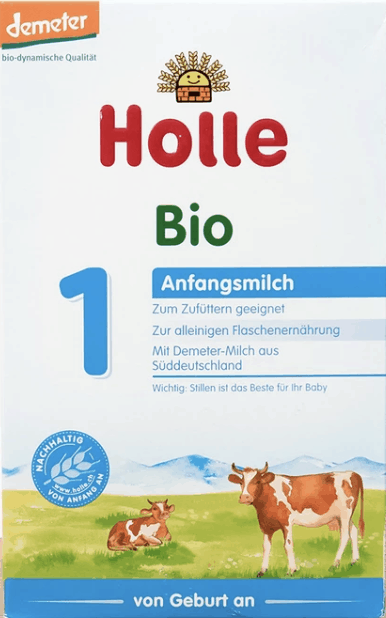
Why I love it: Holle organic baby formula is very comparable to Lebenswert in ingredients, and is also a great option for parents who don’t want pre/probiotics or ARA added to their natural organic formula and want to supplement with that separately.
Holle baby formulas are Demeter biodynamic certified, which has even more stringent and careful regulations than Bioland. This organic cow milk formula has the purest, non-GMO ingredients, the highest standards for animal welfare, and a commitment to biodiversity and sustainability.
Keep in mind: Again, with Holle options, parents would need to supplement pre/probiotics and ARA since it is not included in the formula (DHA is included in this non toxic formula). Holle Stage 1 also has maltodextrin added.
Runner Up #6: Holle Goat – Budget Friendly Organic Goat Milk Formula for Infants
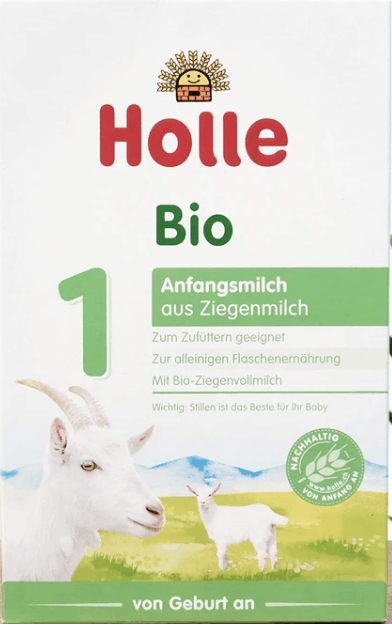
Why I love it: Holle Goat is the only goat milk formulas that is organic. Holle’s goat formula is also suitable for infants. Some evidence suggests the protein ratios in goat milk more closely resemble that of breast milk. There is also research that suggests goat’s milk is more easily and completely digestible by infants than cow’s milk is. This means that goat’s milk formula may be perfect for a baby with sensitivities to cow’s milk formula.
Keep in mind: Unlike Kabrita, Holle goat milk formula does not contain added whey (so the whey:casein ratio in Holle might be constipating for some babies). This organic infant milk also includes maltodextrin to balance the sweetness of the milk. It also contains no added pre/probiotics or ARA (DHA is included in the new formulation).
The Best Hypoallergenic Formulas For Babies
If you’re looking for detailed information about the best hypoallergenic baby formulas, this post outlines the best options as well as what ingredients to look for to find the best fit for your baby. I have included a short summary of the top 3 hypoallergenic formulas below as well!
1. HiPP Hypoallergenic – Best for Cow’s Milk Protein Sensitivities or Allergies
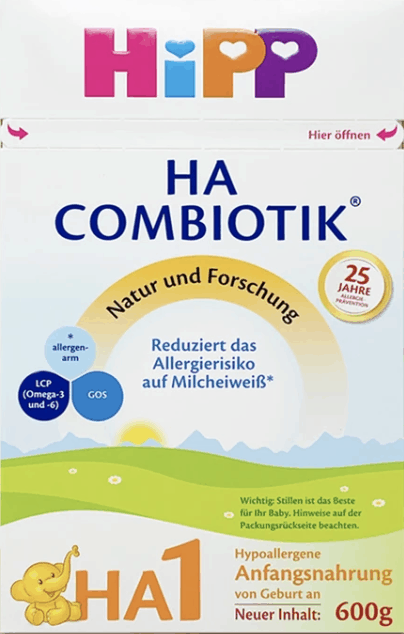
Why I love it: HiPP Hypoallergenic baby formula is free of casein and contains protein hydrolysates that break down proteins for infants who have sensitive stomachs. It also contains pre and probiotics and DHA. Try this gentle formula without corn syrup if your baby has a cow’s milk allergy or sensitivity and you haven’t tried another hypoallergenic option (or you’re trying to move away from the US hypoallergenic options because of concerns over ingredients). Has extensively hydrolyzed protein, (86-87% broken down), 100% whey (no casein), but with the same lactose content as a non-hypoallergenic baby formula. So if your baby has severe lactose intolerance, this may not work well for them.
Keep in mind: HiPP Hypoallergenic is not technically organic, because hydrolyzing the milk protein requires more processing. However, all other ingredients included are still organic.
2. HiPP Comfort – Best for more severe cow’s milk protein allergies
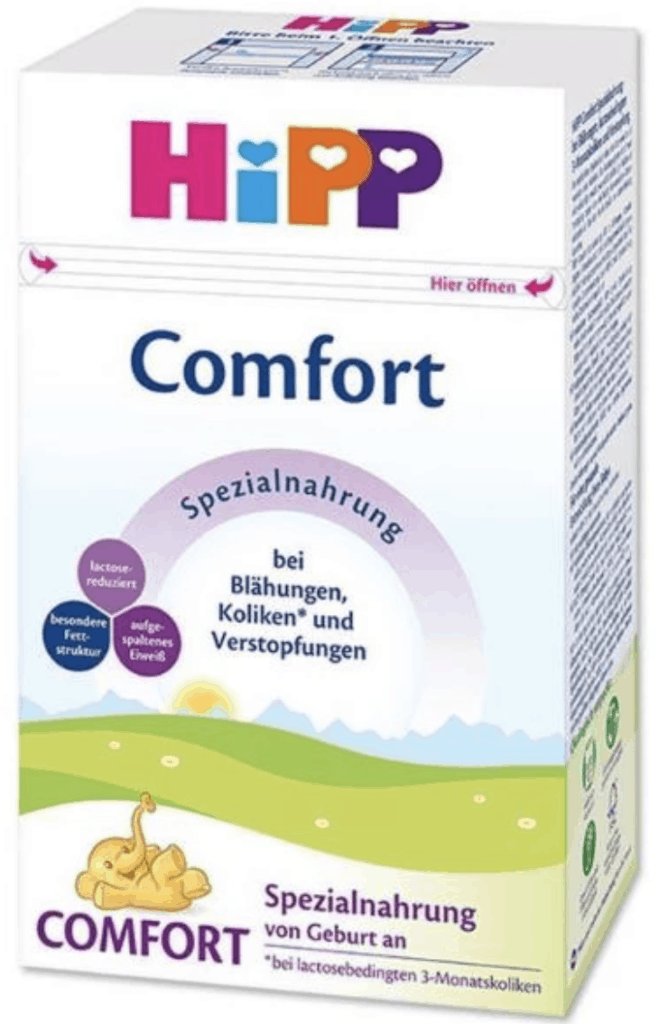
Why I love it: This is the most gentle formula from the EU, and is worth trying for babies who don’t do well on HiPP HA. It is the most similar to a US hypoallergenic formula and is more broken down than HiPP HA. It contains extensively hydrolyzed protein, (86-87% broken down), 100% whey (no casein), reduced lactose content and modified fats. While technically, HiPP HA is a hypoallergenic formula and Comfort is not specifically a hypoallergenic formulation but rather indicated for gassiness, colic and constipation, we have found parents seeking a “hypoallergenic” formula have been successful with Comfort. But, their success may be due to the reduced lactose content in addition to the hydrolyzed protein.
Keep in mind: HiPP Comfort is not technically organic, because hydrolyzing the milk protein requires more processing. However, all other ingredients included are still organic. Also, while HiPP Comfort is the closest to a US hypoallergenic formula, it’s still not as broken down as Alimentum or Nutramigen (which is 93% hydrolyzed). The US hypoallergenic formulas are usually suited for babies who have a medical condition s called CMPA (cow’s milk protein allergy). So if your baby can’t tolerate Comfort you will have to move to a US hypoallergenic formula.
3. HiPP Anti-Reflux – Best for Reflux
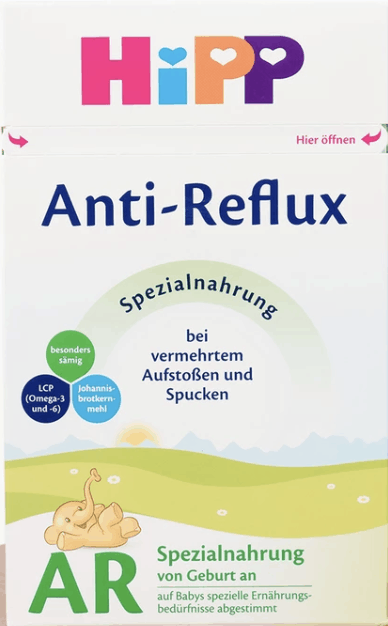
Why I love it: HiPP Anti-Reflux formula is EU certified organic, and it is a good choice for babies with sensitive tummies. This formula uses 100% whey (and no casein) to prevent reflux or spit up. It can be one of the best formulas for gas due to its lack of casein. It contains DHA, and also contains prebiotics and probiotics to benefit your baby’s digestive system.
Keep in mind: HiPP Anti-Reflux contains organic maltodextrin (in addition to lactose). This is to help in easing digestion for little ones.
Best Organic Baby Formulas Comparison Chart
Below is a detailed chart ranking all of the best organic baby formulas, based on each of the ingredients in baby formula. You can see the differences between Kendamil vs. Hipp vs. Holle vs. Bobbie along with all of the other best baby formula brands. At the top of the chart, I’ve included a hypothetical line for the “ideal” cleanest formula. Use this line as a way to measure all of the other formulas against, to find the right baby formula for your child.
For anyone looking for a goat milk formula specifically, I have a separate organic formula comparison chart in What’s the Best Goat Milk Formula for Your Baby?
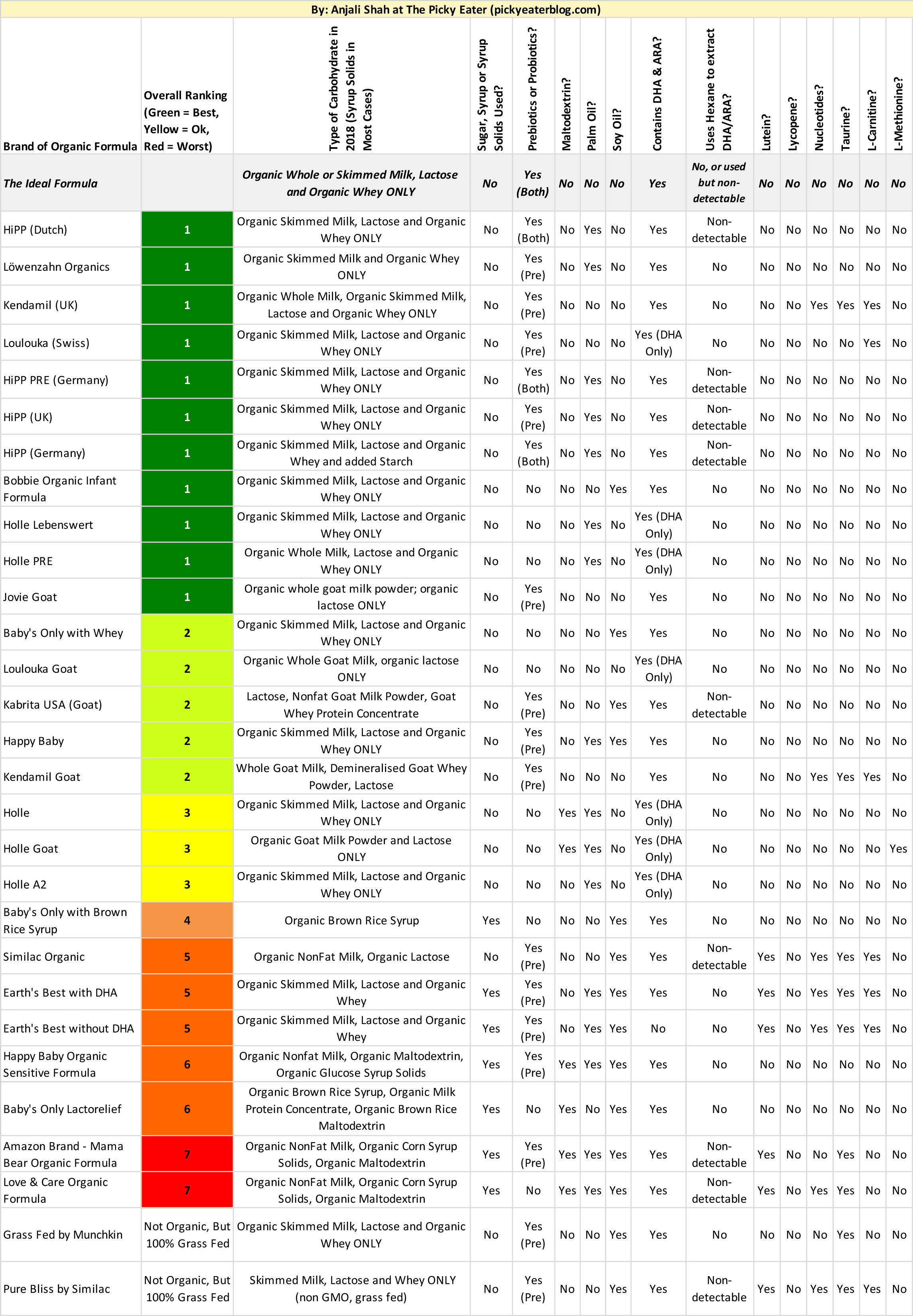
Note: Regarding GrassFed and PureBliss – while they are popular formula brands, they are not part of my best organic baby formulas list (since they are not technically organic). But they are non GMO and antibiotic free, and their ingredients list is relatively clean, so I would say they are better than all of the non-organic formulas available in the US today.
Discontinued Baby Formulas
There are a few baby formula brands I had to remove from the chart above, due to them being discontinued. They are:
- The Honest Company Organic Formula: Founded by Jessica Alba, The Honest Company was created to develop high quality baby products with clean ingredients and budget friendly prices. They had two stages of Honest organic formula, but have since discontinued both.
- Plum Organics Infant Formula: We don’t know why Plum Organics discontinued their infant formula, but it no longer appears in our guide since it’s no longer available.
- Happy Tot Toddler Formula: Has been discontinued as of a few years ago.
- Gerber Organic Formula: Also has been discontinued
Note: Due to formula shortages, Loulouka has been difficult to find, but it has not been discontinued, it’s just perpetually out of stock right now! We will update this post as soon as we hear more about Loulouka’s availability. Additionally, Similac Organic Baby Formula also seems to be out of stock, likely due to the formula shortage. It’s not one of our top picks, but it is worth mentioning since it can be a more budget friendly option.
A Note On Breastfeeding Vs. Formula Feeding
We’ve all heard the advice: “Breast is best.” For a few moms, that advice is easy to follow. Unfortunately for many moms, it’s not.
The truth is, breastfeeding is HARD.
Not hard as in “oh this is hard, I don’t feel like doing it,” but hard as in: My baby won’t latch; I have low milk supply; My nipples are sore/bleeding/blistered; I have no place to pump at work; I have mastitis; I’ve seen dozens of lactation consultants, and I’m still having problems.
And then there are all of the moms who can’t breastfeed because of a medical reason, or because they are adoptive parents (or had their children via a surrogate).
That’s all to say – if you love breastfeeding, great. But if you need to supplement or switch to formula, that’s okay!
Many moms feel guilt over weaning early or not being able to breastfeed as much as they’d like. But honestly, the most important thing is the love you give to your baby, and that you and your baby are happy and healthy. Breast isn’t best; FED is best.
For me, nursing my daughter was one of the most physically and emotionally challenging parts of new motherhood. Many of the early days ended in tears. When I weaned her after 8 months of emotionally taxing nursing and pumping, I needed to select a baby formula. Using my background in nutrition, along with extensive research (both reading articles and speaking with doctors and fellow mothers), I was able to arrive at this list of the best formula for baby in this guide.
The Best Vitamin D, DHA, And Probiotics Supplements For Babies
Recommendations on Supplementing: DHA, Vitamin D, Probiotics For Infants and Babies
I have gotten a lot of questions about what to supplement with if your baby is on a formula that doesn’t have DHA added, what probiotic to use, or what to do if your baby is getting some breastmilk along with their formula (in which case you need to add Vitamin D). Note: The EU just released new standards for DHA in baby formula which you can read about here.
If you are looking for additional supplementation for DHA, Vitamin D and/or Probiotics, here are our top picks for baby supplements:
Best Vitamin D Supplement For Babies
Raise Them Well is our top pick for Vitamin D Drops For Babies. Another good option are these Baby Vitamin D Drops. There is literally nothing added to them (no flavors, colors, etc.). They are liquid and you only need one drop in your baby’s bottle per day. You can also just apply the drop on your baby’s pacifier, on your nipple (if you’re nursing), or on your finger and have your baby suck it off. Super easy, tasteless and pure.
Best DHA Supplement For Babies
The only Omega 3 supplement I’d recommend for kids is Nordic Naturals. They have an infant DHA supplement and a children’s DHA supplement – both of which are extremely pure, have no added preservatives or sugar, and are in liquid form so they can be added to just about anything!
Best Prebiotics For Babies
There is only one prebiotic I’ve found that’s safe for babies and toddlers and has super high quality ingredients and no stabilizers or artificial flavors/colors added. I recommend BeginHealth if you are looking to supplement with a prebiotic for your child.
How To Choose The Best Baby Food
For those of you transitioning to solids and looking for homemade baby food recipes, I have a bunch of easy recipes you can try here! But in those instances when you’re on the go and looking for a healthy, organic, pre-made option, my list of the healthiest baby food pouches should help.
Where Can You Buy The Best European Baby Formula In The US?
If you want to buy HiPP, Lebenswert, or Holle online, I have found a few online retailers who are either based in the US or ship to the US in a reliable and safe manner! I’m in personal contact with the owners of all of these companies, I feel comfortable recommending all of them to you.
1. My Organic Company

My Organic Company was founded in 2017 by two parents: Cecelia and Kevin who are dedicated to ensuring that organic European formula is made available to any parents who want them in the US! They have multiple warehouses in Europe to ensure safe, fast and reliable shipping. And their supply chain is so robust they virtually guarantee that they will be in stock of all formulas at all times!
They have all the standard European formulas like HiPP Dutch, HiPP UK, HiPP Germany, Holle, Lebenswert, Goat Milk formula, and the sensitive formulas (HiPP HA, HiPP Comfort, Anti-Reflux); but they even have Loulouka, Good Night Formula from HiPP, as well as Stage 3 and Stage 4 formula from HiPP, Holle, Lebenswert and Loulouka! They offer the largest, most expansive set of European formulas available today, and they have free shipping on orders over $50!
Other things that make them great: they have a comprehensive mixing guide for every formula that’s easily accessible here, they have a subscribe and save option (save an additional 7%), and amazing customer service!
2. Organic’s Best
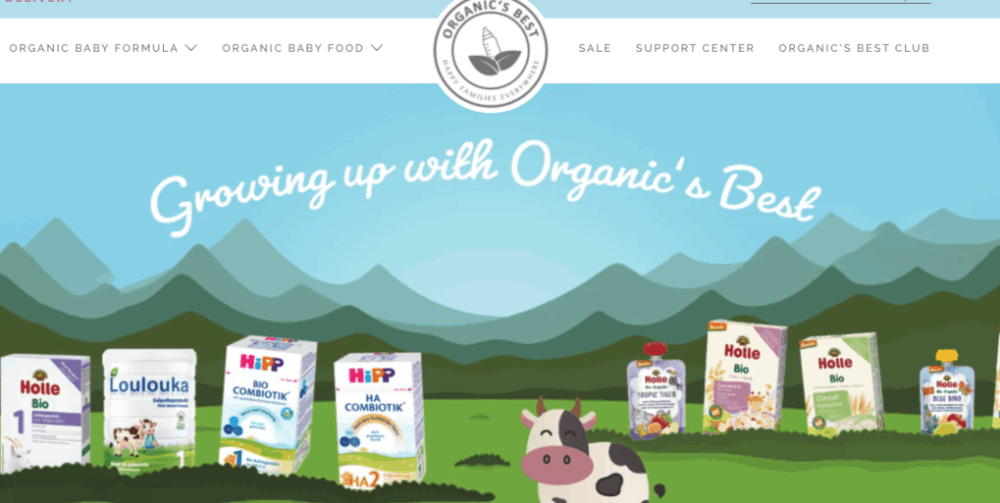
Organic’s Best is based in Germany, and is passionate about making organic baby formula and baby food available internationally (to any family who wants it!) They carry the top organic formula options like HiPP Dutch, HiPP Germany, HiPP UK, Holle, Lebenswert, and Loulouka. They also carry HiPP HA, HiPP Comfort, and HiPP AR.
One thing that makes this company unique is that they ship internationally for free, and they will guarantee express delivery between 1-4 business days to the US. Additionally, every new customer also receives two free boxes of formula! They have low prices, and they include free shipping insurance for every order, and they guarantee availability of all formulas – so you never have to worry about your favorites being out of stock!
3. Bottles & Burps

When it comes to affordability, Bottles & Burps is the lowest priced US retailer I have found that sells some of the best organic formulas for babies like HiPP, Holle, Lebenswert and Kendamil. They can get all of these products to most US households in 5 days from their warehouses.
If you’re looking to save even more, you can order bundles direct from their warehouse in Germany (with free, express 2-5 day shipping to the US). Express shipping from Europe is important because the alternatives can take upwards of 30 days and suffer additional customs delays.
I met with Courtney and Blake, the co-owners, and learned that they had the same experience as I did when trying to find healthy formula for their little one. They are committed to bringing high quality, European formula to parents in the US at an attractive price. Bottles & Burps is also offering a $10 discount code using the code PICKYEATER10 (just enter it manually in the checkout process!)
4. Organic Formula Shop
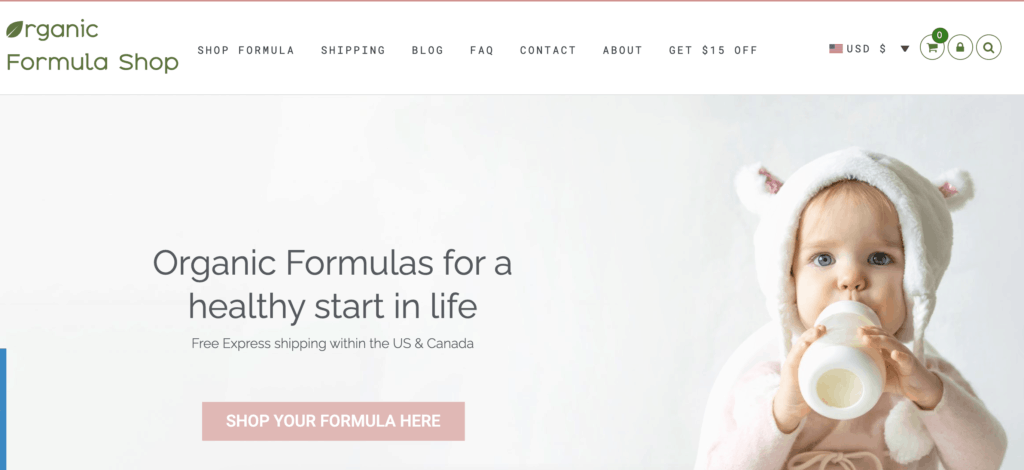
Organic Formula Shop is a family run company that delivers HiPP and Holle straight from the Netherlands, which prevents the formula from being stored at multiple warehouses. Organic Formula Shop was founded by two Dutch parents who both lived and worked in the US and Canada. While raising their families they realized there was a big difference in quality between the European and North American produced formulas. Their mission is to be able to provide parents in the US with the best formula options for their children!
They carry some of the best clean baby formula brands like HiPP Dutch, HiPP German, Holle and Holle Goat’s milk formulas. They also carry the sensitive formulas HiPP HA & HiPP Comfort.
Some things that make this company unique include: no matter your order size, all orders are delivered via Express DHL within 4 business days. If the formula you order doesn’t work for your baby, Organic Formula Shop will work with you to find the right option immediately. They also have 24/7 customer support, and allow bulk purchasing with a 20% discount. On top of that, they are offering my readers $5 off every order by using the code thepickyeater at checkout! Lastly, they even offer a Single Parent Scholarship designed to support a single mother or father with their college or graduate education! I would highly recommend them as a reputable place to order your HiPP and Holle formulas.
5. Organic Baby Food
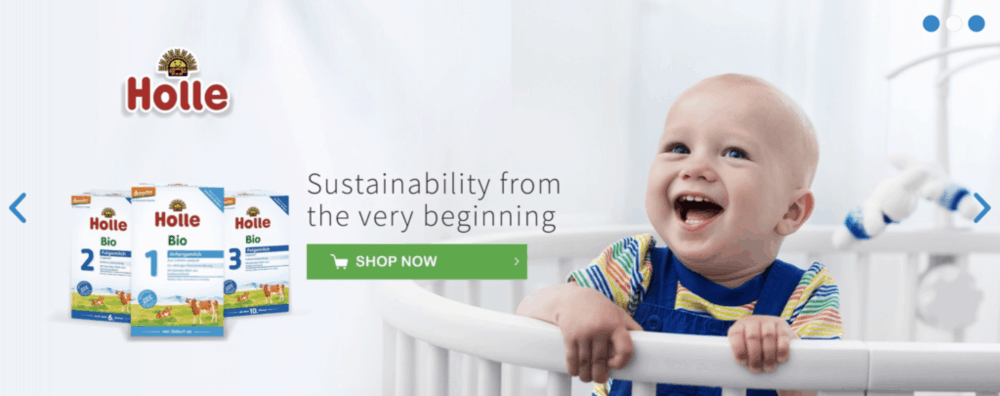
Organic Baby Food is a reputable, online retailer based in the EU who has fast shipping to the US! They have the best organic formula brands like HiPP, Lebenswert, and Holle, along with Hypoallergenic formula and Goat’s Milk formula. They have reasonable prices, reliable shipping (within 1-3 business days!), amazing customer support, and I have been in contact with the owner personally.
In addition to baby formula they also have a variety of organic cereals and snacks for babies from HiPP/Holle/Leb, as well as a line of baby care products (shampoo, lotion, calendula) that are gentle and free of any synthetic ingredients so they are perfect for babies!
A few other great things about this company: guaranteed delivery within 2 days, money back if your shipment is delayed, dedicated customer support (a few hours turnaround time for emails or direct phone support at 1-800-701-4303), and deep discounts up to 60% off sometimes! They are also giving readers of The Picky Eater a 10% off coupon code at checkout – just use the code: PICKY and you will get the discount!
Baby Formula FAQs
Any formula that has a 60:40 whey to casein ratio, and contains the key vitamins and minerals necessary for infant development are very close to breastmilk. HiPP Dutch, Bobbie Formula, Kendamil Formula, Holle, and Lebenswert are all close to breastmilk.
Some US brands like Enfamil claim that they have the formula closest to breastmilk because they include proteins found in colostrum, like lactoferrin, however, Enfamil is not organic so I wouldn’t choose that brand over the others listed above just for the lactoferrin.
There are many options in this guide for the healthiest baby formula! We would rank HiPP, Kendamil, Bobbie, Holle, and Lebenswert all at the top of the list of the cleanest baby formula options.
Organic formulas tend to be better compared to conventional formulas because they are free from pesticides, antibiotics, chemical fertilizers, hormones, and more.
However, not all families may be able to choose organic formula. Other considerations such as price, or needing a hypoallergenic formula (which by definition will not be organic due to the hydrolyzed proteins), or availability should also be kept in mind when choosing a formula.
The different stages of formula correspond to different ages of your baby. Each stage is formulated to meet the nutritional requirements of a specific age and stage of your baby’s development.
Stage PRE/1: This stage is suitable to give to your baby from birth. These formulas tend to be lactose based, and are very gentle and easy to digest. They will contain less iron than later stages, since your baby’s iron stores remain intact until about 6 months of age. Stage PRE/1 is for babies 0-6 months old. Stage PRE is typically a formula for newborns through 3 months of age, but can be used up to 6 months. PRE is also slightly less filling than Stage 1, so you can adjust based on your baby’s appetite between these two stages during the first 6 months of life.
Stage 2: For formulas that only have 2 stages, stage 2 is for 6-12 months of life. For formulas that have 3 stages, stage 2 will typically be for 6-10 months of life. Stage 2 has more iron, and a slightly different mix of vitamins and minerals to adjust to your baby’s growing needs.
Stage 3: Typically used for 10-12 months of life, and sometimes can be used into toddlerhood. It is made specifically to supplement your baby’s diet of solid foods which should be increasing into 11-12 months of life.
All ages formula: Some formulas don’t come in stages (like Bobbie), which means that their all ages formula can be used for 0-12 months of life.
According to the CDC, most baby formulas need to be used within 1 month of opening the container. Unopened formula can be good for up to 6-12 months (use the expiration date on the container to determine how long your formula is good for).
Yes! You absolutely can if you follow standard mixing instructions. You might want to mix formulas if you either feel like your baby does well with a mix of two formulas, or if you are trying to slowly transition from one formula to another.
Final Thoughts
Not every baby likes every formula. Some formulas constipate or irritate some babies, yet keep other babies’ tummies perfectly happy. If you try the formulas I recommend and they don’t work for your baby – that is ok!
There is no perfect formula, but some are still much better than others. If you can afford it, the best organic baby formulas are HiPP, Lebenswert, and Holle – so I’d recommend shipping your formula from Europe whenever possible! Organic infant formulas are more expensive than regular formula, and not every parent has the financial means to buy organic formula for their little ones – and that’s ok, too! Just do the best you can for your baby. No judgments here.
Overall, I advocate a world of no judgments when it comes to breastfeeding or formula feeding. All you can do as a mom is your best. Whether you breastfeed for a year, or 6 months or 1 month, or 0 months doesn’t make you a better or worse mother. A happy healthy mom and happy healthy baby is all that matters.
I hope this post helped you find the right baby formula for you and your little one!
Keep in mind that every person & situation is different, especially yours, so make sure to talk to your doctor and see how these guidelines and tips can help you. These tips are not a substitute for professional medical advice, diagnosis, or treatment. Never disregard or delay in seeking professional medical advice because of something you read here!
My recommendations are based on the manufacturer’s claims and ingredients list, and what I feel best giving to my own family. Your individual results may be different based on your overall diet, exercise, age, weight, family history, or pre-existing conditions.
Appendix: More Info on Hexane Extracted DHA/ARA in Formula
I spoke with an expert who has her BS in Biology with a minor in Chemistry, who worked in an organic chemistry lab for 2 years and worked with many solvents used in extractions, compound purification, and analysis, and then went on to get an MS in Biochemistry and Molecular Biology. She is extremely knowledgable when it comes to hexane and extraction methods, so I asked her for her thoughts on how concerned we should be about hexane-extracted DHA/ARA in the best organic baby formulas on this list. Here is the summary:
- Hexane is often used as extraction solvent for extracting fats. This is because it has a low boiling point when compared to most fats, which makes it easy to get rid of post-extraction – leaving the fat behind.
- To get rid of Hexane, chemists use a large apparatus called a “rotary vap” that gets rid of the solvents and you end up with a pure powder substance (usually a chemical compound). The next step is to check the purity of the compound using a machine called an NMR or MS, which tells you whether you have any of your solvent left.
- This woman told me that she never, ever found an issue with having hexane still present after drying her sample.
- Since formulas are a powder, they are heated to the point of water removal, and therefore the hexane should be all gone. It is unlikely that hexane is left in properly treated formula, but you are placing trust in the formula and manufacturing industry that all formula is being properly prepared.
- Note: All oils that don’t have a cold-pressed process are extracted using hexane – this includes corn oil, soy oil, vegetable oil, etc. (unless otherwise specified on the bottle). Hexane is also used during the development process for drugs – many drugs are purified in a hexane solvent and then it is dried off. So if you are going to question hexane, you need to be aware of the other areas where it is used in our regular food and drug supply!
- When it comes to being concerned about hexane vs. other questionable ingredients in organic formulas – maltodextrin, soy oil, etc., I’d be more concerned about maltodextrin vs. hexane extracted DHA. This is because maltodextrin’s glycemic index is much higher than table sugar and I personally believe a lot of issues today come from sugar and inflammation, and even when hexane is used it should be gone by the time the formula is packaged.
- Unfortunately, there is no formula out there that doesn’t have at least one of the “offending” ingredients in formula milk that I have listed above! For me personally, I would choose hexane-extracted DHA over maltodextrin or soy oil for example. This is because soy oil is also extracted using hexane, and maltodextrin has an extremely high glycemic index. In addition, formulas that contain soy oil or maltodextrin are 100% guaranteed to contain these ingredients, versus hexane which is likely not traceable in a formula that has used it as a method to extract DHA/ARA before the formula has been prepared!



